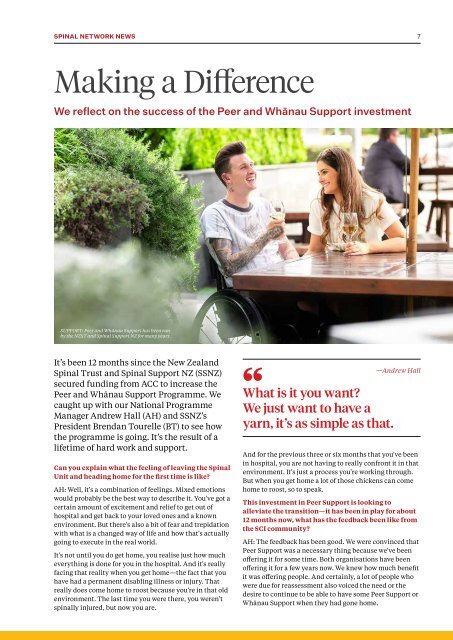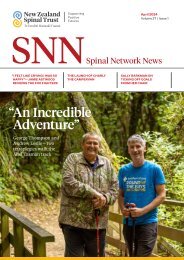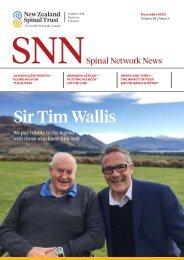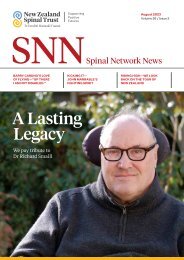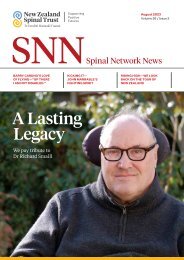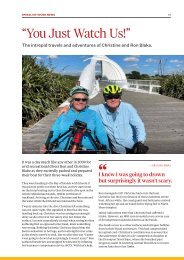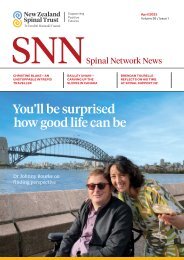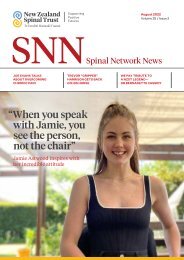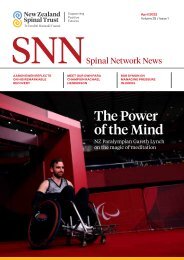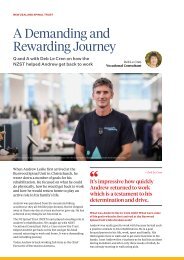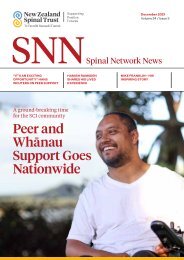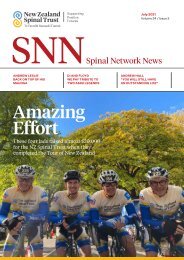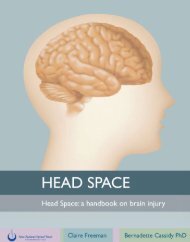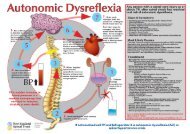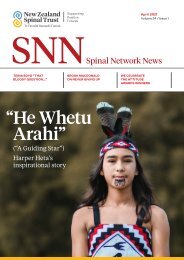SNN_December 2022 Issue_web low res
You also want an ePaper? Increase the reach of your titles
YUMPU automatically turns print PDFs into web optimized ePapers that Google loves.
SPINAL NETWORK NEWS 7<br />
Making a Difference<br />
We reflect on the success of the Peer and Whānau Support investment<br />
SUPPORT: Peer and Whānau Support has been run<br />
by the NZST and Spinal Support NZ for many years.<br />
It’s been 12 months since the New Zealand<br />
Spinal Trust and Spinal Support NZ (SSNZ)<br />
secured funding from ACC to increase the<br />
Peer and Whānau Support Programme. We<br />
caught up with our National Programme<br />
Manager Andrew Hall (AH) and SSNZ’s<br />
P<strong>res</strong>ident Brendan Tourelle (BT) to see how<br />
the programme is going. It’s the <strong>res</strong>ult of a<br />
lifetime of hard work and support.<br />
Can you explain what the feeling of leaving the Spinal<br />
Unit and heading home for the first time is like?<br />
AH: Well, it's a combination of feelings. Mixed emotions<br />
would probably be the best way to describe it. You've got a<br />
certain amount of excitement and relief to get out of<br />
hospital and get back to your loved ones and a known<br />
environment. But there's also a bit of fear and trepidation<br />
with what is a changed way of life and how that's actually<br />
going to execute in the real world.<br />
It's not until you do get home, you realise just how much<br />
everything is done for you in the hospital. And it's really<br />
facing that reality when you get home—the fact that you<br />
have had a permanent disabling illness or injury. That<br />
really does come home to roost because you're in that old<br />
environment. The last time you were there, you weren't<br />
spinally injured, but now you are.<br />
What is it you want?<br />
We just want to have a<br />
yarn, it’s as simple as that.<br />
—Andrew Hall<br />
And for the previous three or six months that you've been<br />
in hospital, you are not having to really confront it in that<br />
environment. It's just a process you're working through.<br />
But when you get home a lot of those chickens can come<br />
home to roost, so to speak.<br />
This investment in Peer Support is looking to<br />
alleviate the transition—it has been in play for about<br />
12 months now, what has the feedback been like from<br />
the SCI community?<br />
AH: The feedback has been good. We were convinced that<br />
Peer Support was a necessary thing because we've been<br />
offering it for some time. Both organisations have been<br />
offering it for a few years now. We knew how much benefit<br />
it was offering people. And certainly, a lot of people who<br />
were due for reassessment also voiced the need or the<br />
desire to continue to be able to have some Peer Support or<br />
Whānau Support when they had gone home.


